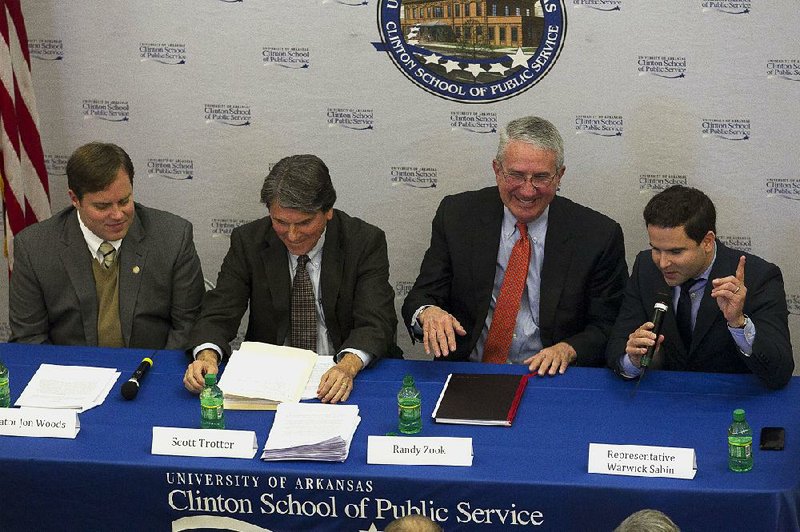A constitutional amendment extending term limits for state lawmakers, prohibiting lobbyists from giving certain gifts to state elected officials, and banning direct corporate and union contributions to candidates is "another lawyers' relief act," the president and chief executive officer of the Arkansas State Chamber of Commerce warned Monday.
There will be a lot of court cases to clear up issues, chamber executive Randy Zook said during a panel discussion at the University of Arkansas Clinton School of Public Service in Little Rock. Known as Issue 3 on the Nov. 4 ballot, it is now Amendment 94 to the Arkansas Constitution.
"I've had at least 10 really good top lawyers tell me that the 16-year [term limit for state lawmakers in Amendment 94] starts anew for everybody, and I know that [Rep. Warwick Sabin, D-Little Rock] and others will shake their heads," Zook said. He later said that he would have to get the permission of the lawyers to disclose their names.
"My guess is we need a declaratory judgment from the state Supreme Court that fast-tracks the issue and removes the question from the table," he said. "A lot of good lawyers say that the clock starts over for everybody who is in the Legislature today and everybody [who] served before."
But state Sen. Jon Woods, R-Springdale, who proposed the constitutional amendment along with Sabin, said Bureau of Legislative Research attorneys "are ready to stand up and say the original intent is absolutely that you can do no more than 16 years combined [in the House and the Senate] and that the differing attorneys' opinions to them don't make sense.
"They are confident it is only 16 years total and it is not starting a new," he said. "We amended the existing term limits, so it is an amendment to the existing code."
Previously, lawmakers were limited to serving three two-year terms in the state House of Representatives and two four-year terms in the state Senate. Some senators were eligible to serve an additional two years after legislative district boundaries were redrawn every 10 years.
During the panel discussion, Woods said he initially only wanted to allow representatives to serve one more two-year term so lawmakers would be limited to serving eight years in the House and eight years in the Senate. He said representatives had been "at a complete disadvantage" in their dealings with state bureaucrats, lobbyists, senators and governors because they were limited to serving six years in the House.
But he said allowing lawmakers to serve up to 16 years total in the House and Senate "was brought to me by quite a few other lawmakers," so that provision was added to the proposed constitutional amendment in last year's session.
Woods later said the group included state Reps. Nate Bell, R-Mena, Charlie Collins, R-Fayetteville, and Jim Dotson, R-Bentonville. Dotson said he doesn't recall the discussions from two years ago. Bell and Collins could not be reached immediately for comment by telephone Monday night.
Attorney Scott Trotter of Little Rock, who helped Sabin and Woods draft the ethics provisions in the amendment, said the U.S. Term Limits group based in Palm Beach, Fla., could underwrite a proposed constitutional campaign to repeal the term-limits extension in 2016.
Afterward, Tim Jacob of Little Rock, co-chairman of Arkansas Term Limits, said his group will decide before the end of January whether to gather signatures for a proposed constitutional amendment to repeal the extended term limits in the 2016 election.
Nick Tomboulides, executive director of U.S. Term Limits, said the Arkansas group would decide whether to push a proposed constitutional amendment.
During the panel discussion, Trotter said he wouldn't be surprised to see a lawsuit filed to challenge the ban on direct corporate contributions to candidates.
Zook said Amendment 94 also may lead to "some unintended consequences" as a result of having a seven-member citizens commission decide whether to raise the salaries of state elected officials "rather than an accountable Legislature voting on pay raises."
The commission includes two appointees each from House Speaker Davy Carter, R-Cabot, Senate President Pro Tempore Jonathan Dismang, R-Searcy, and Gov. Mike Beebe, as well as one from Supreme Court Chief Justice Jim Hannah. The commission was appointed last week and is required to make its decisions on salaries of state elected officials by early February.
Zook said he worried that "we may see ourselves moving closer and closer to a full-time Legislature" in the event of rising legislative salaries, and he said he's not sure that would be wise in a state with the population of metropolitan St. Louis.
"There is no question that people make enormous sacrifices to come down here and serve, and it is costly," Zook said. "Our term limits were ridiculous. We at the state chamber were in favor of at least some change and improvement to remove some of the restrictions, but that isn't what got on the ballot."
Woods said he wanted to create the citizens commission to raise the salaries of state elected officials because "a lot of lawmakers were put in a bad situation."
"I saw some marriages fail. I saw some lawmakers destroy their credit. I have seen bad behavior, and we've all read about some of that in the paper," he said. Lawmakers are paid about $15,000 a year plus per diem and mileage and expense reimbursements that average $35,000 a year.
Zook said lobbyists generally welcome the ban on purchasing meals for state elected officials during one-on-one meetings. Lobbyists instead can invite a legislative committee, the House, Senate or entire Legislature to a meal under the amendment.
"We just want to know the rules because we don't want to get the members in trouble," he said.
Sabin said he and Woods intend to pass a bill early in next year's session to allow the state Ethics Commission's staff to answer questions about Amendment 94, allow the commission to adopt rules enacting the amendment's provisions and clarify questions about it.
Metro on 12/09/2014
